|
|
|
Sort Order |
|
|
|
Items / Page
|
|
|
|
|
|
|
| Srl | Item |
| 1 |
ID:
159973
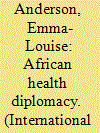

|
|
|
|
|
| Summary/Abstract |
Health crises pose fundamental challenges to international relations and have been a major focal point of contests for global influence, particularly in the global South, where such crises are most acute. This necessitates a focus on the arenas of global health diplomacy and the power struggles that emanate from them, including the often-overlooked agency of African actors within these arenas. Drawing upon a total of 3 months of fieldwork in 2007 and 2014 that included 68 key-informant interviews, participant observations, and informal discussions, this article interrogates the mechanics of multi-stakeholder health diplomacy in Malawi, where a near-permanent state of health crisis and underdevelopment has generated extreme dependency on external health assistance. This article conceptualises shadow diplomacy as the informal networks and channels of influence that run parallel to, but are not recognised as part of, formal diplomacy. This concept reveals how health is key to struggles for leverage by both international and local actors, giving rise to informal and subversive manifestations of diplomacy in the ‘shadows’. It enables us to understand not only how Western powers consolidate and obscure their enduring power but also how the ‘shadows’ benefit African political elites as they leverage their dependency to subvert global power structures for their own ends. It disrupts the external/internal binary of international donors/African states and reveals that these are not monolithic actors but instead comprising complex individuals with multi-faceted motivations and divided loyalties.
|
|
|
|
|
|
|
|
|
|
|
|
|
|
|
|
| 2 |
ID:
133617
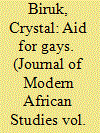

|
|
|
|
|
| Publication |
2014.
|
| Summary/Abstract |
In recent years, 'African homophobia' has become a spectacle on the global stage, making Africa into a pre-modern site of anti-gay sentiment in need of Western intervention. This article suggests that 'homophobia' in post-2009 Malawi is an idiom through which multiple actors negotiate anxieties around governance and moral and economic dependency. I illustrate the material conditions that brought about social imaginaries of inclusion and exclusion - partially expressed through homophobic discourse - in Malawi. The article analyses the cascade of events that led to a moment of political and economic crisis in mid-2011, with special focus on how a 2009 sodomy case made homophobia available as a new genre of social commentary. Employing discourse analysis of newspaper articles, political speeches, the proceedings of a sodomy case, and discussions about men who have sex with men (MSM) as an HIV risk group, I show how African homophobia takes form via interested deployments of 'cultural' rhetoric toward competing ends. This article lends a comparative case study to a growing literature on the political and social functions of homophobia in sub-Saharan Africa.
|
|
|
|
|
|
|
|
|
|
|
|
|
|
|
|
| 3 |
ID:
133618
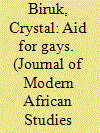

|
|
|
|
|
| Publication |
2014.
|
| Summary/Abstract |
In recent years, 'African homophobia' has become a spectacle on the global stage, making Africa into a pre-modern site of anti-gay sentiment in need of Western intervention. This article suggests that 'homophobia' in post-2009 Malawi is an idiom through which multiple actors negotiate anxieties around governance and moral and economic dependency. I illustrate the material conditions that brought about social imaginaries of inclusion and exclusion - partially expressed through homophobic discourse - in Malawi. The article analyses the cascade of events that led to a moment of political and economic crisis in mid-2011, with special focus on how a 2009 sodomy case made homophobia available as a new genre of social commentary. Employing discourse analysis of newspaper articles, political speeches, the proceedings of a sodomy case, and discussions about men who have sex with men (MSM) as an HIV risk group, I show how African homophobia takes form via interested deployments of 'cultural' rhetoric toward competing ends. This article lends a comparative case study to a growing literature on the political and social functions of homophobia in sub-Saharan Africa.
|
|
|
|
|
|
|
|
|
|
|
|
|
|
|
|
| 4 |
ID:
092682
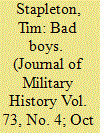

|
|
|
| 5 |
ID:
040484


|
|
Banda
/ Short, Philip
|
1974

|
|
|
|
| Publication |
London, Routledge and Kegan Paul, 1974.
|
| Description |
357p.Hbk
|
| Standard Number |
0710076312
|
|
|
|
|
|
|
|
|
|
|
|
Copies: C:1/I:0,R:0,Q:0
Circulation
| Accession# | Call# | Current Location | Status | Policy | Location |
| 013127 | 923.1/SHO 013127 | Main | On Shelf | General | |
|
|
|
|
| 6 |
ID:
092174
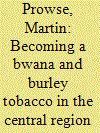

|
|
|
|
|
| Publication |
2009.
|
| Summary/Abstract |
Smallholders now grow most of Malawi's main export crop - burley tobacco. Based on nineteen months' fieldwork in the Central Region, this article offers a sociological interpretation of why some smallholder growers spend a proportion of burley income on conspicuous consumption in rural towns and trading centres. This practice can be seen as a form of inculcated behaviour whereby smallholders reproduce elements of one model of success in this region: that of the Malawian tobacco bwana (boss/master). The article discusses implications from this form of potlatch behaviour by describing the contrasting fortunes of two non-farm rural enterprises, examining data on how tobacco production and 'cooling off' is viewed by wives, and comparing the crop preferences of husbands and wives. It concludes by suggesting that the concept of conspicuous consumption may provide an alternative prism to the instrumental lens of neo-patrimonialism through which to view apparently unintelligible investment decisions in African economies.
|
|
|
|
|
|
|
|
|
|
|
|
|
|
|
|
| 7 |
ID:
109129


|
|
|
|
|
| Publication |
2011.
|
| Summary/Abstract |
The aim of this article is to analyze critically the implications of Malawi's changing nature of politics on civil society organizations (CSOs). The article seeks to clarify whether or not the social, political and economic engagement of civil society organizations has contributed to a strengthened relationship between Malawi' government and its own development agenda, given the CSOs' dependence on 'Northern' aid agencies and/or international NGOs. The article argues that while the change from dictatorial regimes to a multiparty political system has enhanced civil society participation in Malawi's social, economic and political issues, the CSO-government relationship is still fraught with suspicion and mistrust.
|
|
|
|
|
|
|
|
|
|
|
|
|
|
|
|
| 8 |
ID:
068274
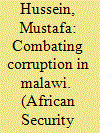

|
|
|
| 9 |
ID:
112472
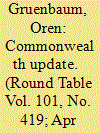

|
|
|
|
|
| Publication |
2012.
|
| Summary/Abstract |
There were clashes between protesters and the police after Mohamed Nasheed was replaced as president of the Maldives by his deputy, Mohammed Waheed Hassan, in what Nasheed said was a coup. A film aimed at raising awareness of the atrocities committed by Joseph Kony, leader of the notorious Lord's Resistance Army militia in Uganda, became an internet phenomenon, being seen by close to 100 million people in a month, but also drew fierce criticism. The Boko Haram Islamist uprising in Nigeria claimed hundreds more lives with the rebels rejecting offers to negotiate. Australia's prime minister, Julia Gillard, defeated a challenge to her leadership by her foreign minister, Kevin Rudd. Fears grew for the nascent democracy in Malawi as a prominent human rights lawyer and critic of President Bingu wa Mutharika was jailed. The king of Tonga, who introduced democracy to the south Pacific nation, died.
|
|
|
|
|
|
|
|
|
|
|
|
|
|
|
|
| 10 |
ID:
185142
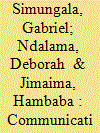

|
|
|
|
|
| Summary/Abstract |
We draw from the meaning-making practices on the margins, the communicative repertoires of the multilingual and multicultural students at two Southern African universities: the University of Zambia in Lusaka, Zambia; and the University of Malawi in Zomba, Malawi. As our locus, we are interested in the unique linguistic/semiotic coinages which constitute the students’ linguistic repertoires as multilingual innovations amenable to placemaking. In an attempt to do this, we purposefully unearth lexical innovations which we analyse within the broader framework of translanguaging. Thus, we show the emergence of (new) lexical items through the (re-)invention and disinvention of communicative resources, and the deployment of material artefacts of place as a basis for the creativity and innovation through repurposing of lexical items for new uses. Thus, we privilege students as active manipulators of their communicative practices by showing the semiotic/linguistic creativity and innovation inherent in their repertoires.
|
|
|
|
|
|
|
|
|
|
|
|
|
|
|
|
| 11 |
ID:
118966
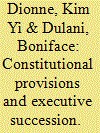

|
|
|
|
|
| Publication |
2013.
|
| Summary/Abstract |
Four African leaders died in 2012. This article explores the constellation of factors that together led to a constitutional succession after President Bingu wa Mutharika's death in Malawi, despite plotting by the late President's allies to circumvent the constitution and install their own candidate over Vice-President Joyce Banda. We present data on executive deaths in office since 1961 and executive transfers of power 2010-12 in order to situate the Malawi transition within the broader African context, and draw especially on comparisons to executive successions that followed the death-in-office of presidents in Nigeria (2010) and Zambia (2008). We assert from these cases that constitutional provisions on executive succession are necessary in precipitating peaceful transitions, but also argue that periods of delay indicate that such provisions are insufficient on their own. We contend that presidential death is more likely to lead to transition than presidential incapacity. The Malawian case in particular illustrates how a constitutional transition requires support from key actors, particularly the Cabinet, military leaders, judiciary, civil society, and the independent media. Public rejection of military or authoritarian rule, and the growing precedent for constitutional succession in Africa, are additional drivers of peaceful transitions.
|
|
|
|
|
|
|
|
|
|
|
|
|
|
|
|
| 12 |
ID:
157197
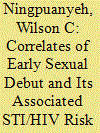

|
|
|
|
|
| Summary/Abstract |
This study explores the correlates of early sexual debut and risk factors of sexually transmitted infections (STIs) among the youth in Malawi. Data was obtained from the Malawi Demographic Health Survey 2010. Out of a sample of 2987 males and 9559 females aged 15–24 years, 1405 males and 5217 females were considered. Chi-square and multivariate analysis was performed and findings presented by gender. The results indicate that females aged 15–19 years (OR=4.18), who were Muslims (OR=1.42), with no education (OR=3.99), were significantly more likely to initiate sexual debut early. Meanwhile, males aged 15–19 years (OR=3.50), from the northern region (OR=2.35) and of the Chewa ethnic group (OR=1.45) were significantly more likely to initiate sexual debut early. Muslims males (OR=0.57), from the poorest (OR=0.69) households were significantly less likely to initiate sexual debut early. Females who initiate sex earlier form a distinct risk group in this study. Specific intervention is therefore needed for young females in their early teen years before they initiate sexual debut.
|
|
|
|
|
|
|
|
|
|
|
|
|
|
|
|
| 13 |
ID:
176486


|
|
|
|
|
| Summary/Abstract |
The article argues that the impact of law enforcement efforts against corruption deserves more scholarly attention. Drawing on a mixed-methods study from Malawi in southern Africa, where a large-scale law enforcement operation has been investigating and prosecuting those involved in a 2013 corruption scandal known as ‘Cashgate’, the article explores the potential for corruption deterrence from the perspective of government officials in the Malawi civil service. Malawi provides a challenging environment for deterrence due to limited state capacity, weak law enforcement agencies and widespread corruption. Nonetheless, the research findings show that Malawian government officials perceive prosecutions and convictions to deter corruption, both with regards to the law enforcement response to Cashgate specifically and law enforcement efforts in general. The findings from Malawi suggest that law enforcement and criminal justice have the potential to make an important contribution to anti-corruption strategies in Africa and the Global South at large.
|
|
|
|
|
|
|
|
|
|
|
|
|
|
|
|
| 14 |
ID:
123290


|
|
|
|
|
| Publication |
2013.
|
| Summary/Abstract |
There are 54 countries on the African continent, but only one has managed to elect a woman, Ellen Johnson Sirleaf in Liberia, as chief executive. While African countries face unique issues, there is a common thread in the struggles of female politicians in male-dominated, traditional societies. The case of Joyce Banda, the President of Malawi, is illustrative.
|
|
|
|
|
|
|
|
|
|
|
|
|
|
|
|
| 15 |
ID:
076874
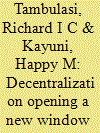

|
|
|
|
|
| Publication |
2007.
|
| Summary/Abstract |
This article evaluates the first four years of decentralized local governance in Malawi with special focus on accountability of local assemblies. The article mainly relies on primary sources such as newspapers, governmental and non-governmental reports and a comparative literature survey. We argue that decentralized local governance in Malawi has enhanced corruption among the local assemblies in relation to their election, awarding of contracts and other related acts. This has consequently led to, inter alia, financial mess in local assemblies, loss of citizen and donor trust as well as low-quality infrastructures. Meanwhile, the democracy and good governance that were envisaged in the creation of local assemblies through the Local Government Act 1998 and the Malawian constitution have seriously been undermined
|
|
|
|
|
|
|
|
|
|
|
|
|
|
|
|
| 16 |
ID:
155794


|
|
|
|
|
| Summary/Abstract |
Drawing on 70 interviews with civil society staff in Malawi, I argue that when development trends and issues in the country change, at donors’ wishes, organizations proactively strategize to vie for donor funds. Collected over three research trips, my data show that between 2008 and 2010 there was a widespread belief among civil society in Malawi that climate change was becoming the “it” issue, surpassing HIV/AIDS in predominance. Alongside this belief, there was a dynamic, if invisible, process of organizational repositioning. Comparing the earlier interviews with those conducted in 2014, I contend that the issues of focus, while interesting, are less telling than the ways Malawian organizations endeavor to adapt and respond to them. This paper adds a critical dimension to development literature, investigating a process that occurs when development agendas change.
|
|
|
|
|
|
|
|
|
|
|
|
|
|
|
|
| 17 |
ID:
089760
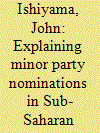

|
|
|
|
|
| Publication |
2009.
|
| Summary/Abstract |
To what extent do parties in Africa behave in ways similar to parties in new democracies elsewhere in the world? I examine nominations by the `minor' opposition parties to the single member districts for the legislative elections in Ethiopia, Malawi and Zambia. Using binary logit analysis, I found that generally the number of candidates running in a contest and the use of an `electoral arithmetic' by the parties explains whether they chose to nominate a candidate in a particular electoral district. However, the social demographic characteristics of districts appear to have little impact on whether or not a party nominates a candidate.
|
|
|
|
|
|
|
|
|
|
|
|
|
|
|
|
| 18 |
ID:
096738


|
|
|
|
|
| Publication |
2010.
|
| Summary/Abstract |
This article examines woodfuel policy challenges and opportunities in Malawi two decades after woodfuel-crisis narratives and counter-narratives. A nuanced examination of woodfuel supply, demand, use, and markets illuminated options to turn stagnant policies based on charcoal 'bans' and fuel-substitution into proactive, realistic ones acknowledging woodfuel dominance and its socio-economic importance. Findings revealed growing, spatially differentiated woodfuel deficits in southern and central Malawi and around Blantyre, Zomba and Lilongwe cities. Poverty, limited electricity access, reliability and generation exacerbated by tariff subsidies, and complex fuel-allocation decisions restricted energy-ladder transitions from woodfuels to electricity, producing an enduring urban-energy mix dominated by charcoal, thereby increasing wood consumption. Diverse socio-political interests prevented lifting of the charcoal 'ban' despite progressive forest laws. Despite implementation challenges, lessons already learnt, efficiency and poverty-reduction arguments, limited government capacity, growing illegal production of charcoal in forest reserves, and its staying power, make targeted community-based forest management (CBFM) approaches more practical for regulated, commercial production of woodfuels than the status quo. New differentiated policies should include commercial woodfuel production and licensing for revenue and ecological sustainability under CBFM or concessions within and outside selected reserves, an enterprise-based approaches for poverty reduction, smallholder/private tree-growing, woodfuel-energy conserving technologies, improved electricity supply and agricultural productivity.
|
|
|
|
|
|
|
|
|
|
|
|
|
|
|
|
| 19 |
ID:
097593


|
|
|
|
|
| Publication |
2010.
|
| Summary/Abstract |
This article examines woodfuel policy challenges and opportunities in Malawi two decades after woodfuel-crisis narratives and counter-narratives. A nuanced examination of woodfuel supply, demand, use, and markets illuminated options to turn stagnant policies based on charcoal 'bans' and fuel-substitution into proactive, realistic ones acknowledging woodfuel dominance and its socio-economic importance. Findings revealed growing, spatially differentiated woodfuel deficits in southern and central Malawi and around Blantyre, Zomba and Lilongwe cities. Poverty, limited electricity access, reliability and generation exacerbated by tariff subsidies, and complex fuel-allocation decisions restricted energy-ladder transitions from woodfuels to electricity, producing an enduring urban-energy mix dominated by charcoal, thereby increasing wood consumption. Diverse socio-political interests prevented lifting of the charcoal 'ban' despite progressive forest laws. Despite implementation challenges, lessons already learnt, efficiency and poverty-reduction arguments, limited government capacity, growing illegal production of charcoal in forest reserves, and its staying power, make targeted community-based forest management (CBFM) approaches more practical for regulated, commercial production of woodfuels than the status quo. New differentiated policies should include commercial woodfuel production and licensing for revenue and ecological sustainability under CBFM or concessions within and outside selected reserves, an enterprise-based approaches for poverty reduction, smallholder/private tree-growing, woodfuel-energy conserving technologies, improved electricity supply and agricultural productivity.
|
|
|
|
|
|
|
|
|
|
|
|
|
|
|
|
| 20 |
ID:
072836
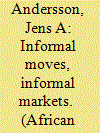

|
|
|
|
|
| Publication |
2006.
|
| Summary/Abstract |
International migration from Malawi has changed profoundly since centrally organized mine migration to South Africa ended in the 1980s. Contemporary movements are more diverse and less tied to labour, as informal trade has developed alongside. This article replaces a common 'productivist' perspective on migration with a decentralized approach, using ethnographic observation and anthropological case studies to understand interrelated flows of people and goods. It shows how in an emergent informal market for South African goods in Mzimba, Malawi, price information does not structure trade practices. Historical continuities in the socio-cultural organization of illegal migration, rather than liberalized market forces, shape this economic configuration, including price formation.
|
|
|
|
|
|
|
|
|
|
|
|
|
|
|
|
|
|
|
|
|